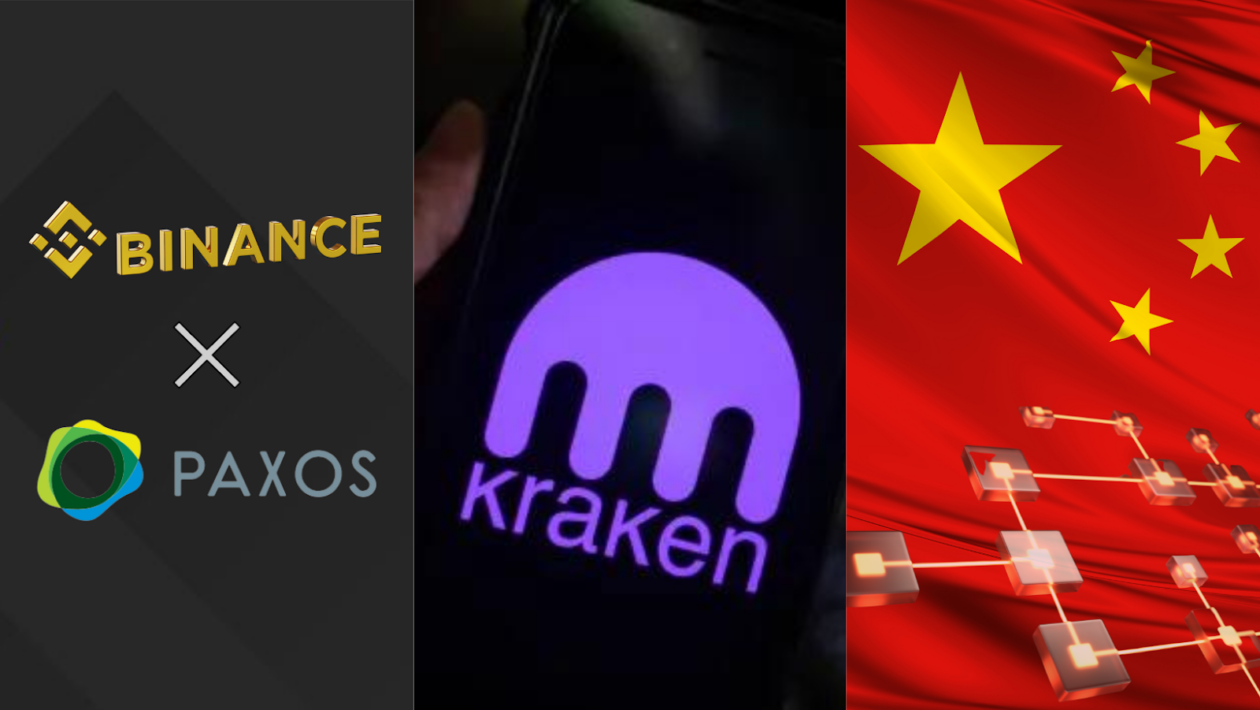In this issue
- Paxos: BUSD bust
- Kraken: Crackdown
- Chinese blockchain: Growing concern
From the editor’s desk
Dear Reader,
Every action has an equal and opposite reaction, according to Isaac Newton’s third law of physics. And in 2023, we’re seeing that play out for digital assets, too.
This should surprise no one. The collapse of FTX was likely the last straw for American authorities following the considerable liberties taken by some of the less reputable players in the business, and crypto has been put on notice that it had better straighten up and fly right if it’s going to avoid more supervision than many in the community would like.
To be fair, the mood music in the sector had already changed last year after the epic failure of Terra and then Sam Bankman-Fried’s house of cards. Even SBF himself had been pleading for regulation, although his calls for rules and order have more than a whiff of irony these days.
Crypto brokerage Paxos’ troubles with the New York State Department of Financial Services and the lawsuit it may face from the U.S. Securities and Exchange Commission, alongside the woes of crypto exchange Kraken, which has been slapped with SEC charges for failing to comply with disclosure requirements, offer a potent reminder that, as far as American regulators are concerned, the bad old days are truly done.
SEC Chair Gary Gensler, in comments on the Kraken case, has fired a shot across the bows of the industry, sending a clear message that it’s going to be held to the same sort of standards as the rest of the finance sector. The last thing that regulators — or indeed anyone else — want is to have to pick up the pieces when things go south due to further instances of careless corner-cutting and reckless behavior.
The question now is, what the reaction to the regulatory reaction will turn out to be. Either way, it will be those who are more than familiar with the guardrails rather than the buccaneers who will help shape the industry’s future path. Rules will hone innovation, and give it a safe home for all of us.
Until the next time,
Angie Lau,
Founder and Editor-in-Chief
Forkast
1. Gone BUSD

By the numbers: Paxos — over 5,000% increase in Google search volume.
Paxos Trust Company has been ordered by the New York State Department of Financial Services to stop issuing the U.S. dollar-pegged Binance USD (BUSD) stablecoin. The development came a day after reports that the U.S. Securities and Exchange Commission (SEC) may sue Paxos for alleged violations of investor protection laws.
- “We were informed by Paxos they have been directed to cease minting new BUSD by the New York Department of Financial Services … As a result, BUSD market cap will only decrease over time,” Binance co-founder and Chief Executive Changpeng Zhao tweeted on Monday.
- “Paxos will continue to service the product and manage redemptions,” Zhao said. “The funds are #SAFU [protected by the Binance emergency reserve Secure Asset Fund for Users], and fully covered by reserves in their banks, with their reserves audited many times by various audit firms.”
- BUSD was co-developed by Paxos, a New York-based blockchain infrastructure platform, and Binance, the world’s largest cryptocurrency exchange. The Ethereum-based stablecoin, which Paxos has claimed is backed at a one-to-one ratio by holdings of U.S. dollars, has been issued and managed by Paxos.
- BUSD is the third-largest stablecoin by market capitalization. Prior to the NYDFS order on Monday, BUSD had more than US$16.1 billion in circulation, according to CoinMarketCap data. As investors fled, BUSD’s market cap has shrunk by over a billion, to US$15.1 billion as of mid-week in Asia. Over the same time, Tether (USDT), the world’s largest stablecoin, grew by over US$1 billion, to US$69.5 billion, in market cap.
- The SEC may also pursue legal action against Paxos for allegedly issuing BUSD as an unregistered security, according to a report by the Wall Street Journal. The agency has reportedly issued a letter known as a Wells notice to Paxos to alert it to possible enforcement action.
- The Wells notice does not constitute a final decision that the SEC will proceed with a lawsuit, allowing the recipient to respond by explaining why the regulator shouldn’t do so.
- The move appears to be part of the SEC’s broader crackdown on crypto service providers. The SEC also fined U.S.-based crypto exchange Kraken US$30 million last week for failing to register the offer and sale of its crypto staking programs, which spurred Kraken to shut down its staking program for its U.S. users.
Forkast.Insights | What does it mean?
U.S. regulators seem to have run out of patience with crypto projects. The order filed to Paxos to stop minting new stablecoins is another slapdown in a long line of regulators’ enforcement actions against crypto projects in America. Nearly half of all lawsuits filed against crypto companies in the country last year came from the SEC, which last year also greatly increased the size of its staff dedicated to crypto enforcement.
The SEC’s Wells notice marks the first time the regulator has targeted a stablecoin directly. It has previously filed orders against projects that have used stablecoins as part of other products, but it has never before held a stablecoin issuer directly accountable for securities violations.
SEC’s action against Paxos will create two big ripple effects on the industry. The first is the impact on BUSD, which is the backbone of many of Binance’s services. Preventing new issuance is likely to create price shifts as traders move their assets out of BUSD into other stablecoins, such as USDT and USDC.
The second is the impact on crypto markets more broadly. Stablecoins are a gateway for many investors to enter into crypto. If stablecoins become mired in too much uncertainty and investors feel spooked, the industry as a whole may struggle more to find ways to attract crypto investment and capital.
2. Krakdown

By the numbers: Kraken — over 5,000% increase in Google search volume.
The SEC has charged crypto exchange Kraken for allegedly failing to register its crypto staking services, marking the regulator’s first crackdown on crypto staking.
- Kraken has agreed to pay US$30 million to settle the charges and shut down its crypto-staking services for U.S.-based retail users, according to the SEC.
- Staking refers to the process of crypto investors depositing tokens onto certain blockchains to help secure them and receiving rewards — typically in the form of more tokens — in return. It is a common practice on proof-of-stake blockchains such as Ethereum.
- Kraken began offering crypto staking services in late 2019, and the company once advertised an annual return of up to 24%.
- The crackdown on Kraken has sent shivers through the crypto market, with Bitcoin falling below US$22,000 after its biggest January price increase since 2013.
- “Companies like Kraken can offer investment contracts and investment schemes, but they have to have full, fair and truthful disclosure,” Gensler told CNBC while also warning other crypto exchanges to take note.
- Kraken co-founder and Chief Executive Jesse Powell reacted with sarcasm to Gensler’s comments, saying on Twitter: “Wish I’d seen this video before paying a $30m fine and agreeing to permanently shut down the service in the US. How dumb do I look[?]”
- SEC Commissioner Hester Peirce publicly criticized her agency’s action, saying in a statement: “In the current climate, crypto-related offerings are not making it through the SEC’s registration pipeline … Using enforcement actions to tell people what the law is in an emerging industry is not an efficient or fair way of regulating … A paternalistic and lazy regulator settles on a solution like the one in this settlement.”
- In a blog post, U.S. crypto exchange Coinbase contended that crypto staking did not involve securities or fall within the scope of the U.S. Securities Act and that superimposing securities law on such processes could generate “unnecessarily aggressive mandates,” preventing U.S. consumers from accessing basic crypto services.
Forkast.Insights | What does it mean?
Staking services are the latest crypto activity to come under scrutiny by U.S. regulators. Alarmed by what happened to Kraken, Coinbase Chief Executive Brian Armstrong has gone on the offensive to preemptively say that his exchange would fight tooth and nail to defend against any charges that its staking services constitute securities.
But the story is more nuanced than Armstrong is letting on. The SEC’s interest in staking is targeting centralized exchanges offering staking-as-a-service, rather than staking more broadly.
Coinbase and other exchanges have offered staking-as-a-service to customers as a way of diversifying revenue beyond the fees they charge for buying and selling cryptocurrencies. The SEC has taken little interest in the native staking functionality of Ethereum or other networks, which poses a unique problem for exchanges facing dwindling revenues in a crypto downturn.
If a key revenue stream is blocked, expect further layoffs and a gloomier mood to follow. But perhaps the bigger story is how the U.S. has quickly become one of the most challenging environments for some of crypto’s biggest players.
The SEC alone filed nearly half of all the legal actions against crypto companies worldwide. If you include other American enforcement agencies, the number climbs even higher. The increasingly litigious nature of U.S. regulators and added s pressure on crypto projects may spur companies to seek out other jurisdictions that offer a friendlier environment. Expect more upheaval to follow.
3. Growth factor

China’s Ministry of Science and Technology has given the go-ahead for the establishment of a blockchain research and development organization in Beijing to be called the National Blockchain Technology Innovation Centre, according to a local media report.
- The center will be led by the Beijing Academy of Blockchain and Edge Computing (BABEC), a research institute backed by the government and one of the developers of Chang’an Chain (ChainMaker), China’s first domestically developed open-source blockchain platform.
- The new center will handle research and industrial applications of blockchain technology, including fundamental theories, hardware and software development, and the construction of blockchain platforms, according to the report. No details were provided on when the center would open, its budget, or its staffing.
- Earlier this month, BABEC announced the development of the Hive computer cluster, based on Chang’an Chain, which it said was capable of processing more than 240 million smart-contract transactions per second.
- Despite China’s ban on cryptocurrencies, authorities see blockchain technology as a critical part of the nation’s digital strategy and infrastructure. In January, the Beijing municipal government launched a 2.0 version of its data directory based on Chang’an Chain, an application that collects information from more than 80 government departments in Beijing on-chain.
- According to the Blockchain Whitepaper 2022 published by the China Academy of Information and Communications Technology last December, China is home to more than 1,400 blockchain-related companies, or over 20% of the world’s total, and at least 29 Chinese cities and provinces have written blockchain into their five-year plans for 2021-25.
Forkast.Insights | What does it mean?
The establishment of a new state-backed blockchain research center in Beijing, the heart of China’s political power, underscores the nation’s ambition to develop its blockchain industry and become a world leader in the technology, intensifying its tech sector rivalry with the West and in particular, the U.S.
While the West is still wringing hands over FTX’s collapse and spinning its wheels over what to do or not do regarding crypto regulations, China is likely gloating about how it is years ahead of the West in taking decisive action against crypto. China has been shutting down crypto exchanges since 2017 and banning cryptocurrency trading since 2019. In 2021, China banned crypto mining and even made it illegal for overseas Chinese citizens to work for crypto companies.
However, even China’s defenders recognize there could be a downside to China’s crypto ban, which is now close to absolute. A former Chinese central bank official warned last month that the country’s crypto ban may lead to the loss of critical opportunities in the development of digital technologies.
On the blockchain development front, China continues extending its reach into the rest of the world. BSN Spartan, a Chinese blockchain available only outside the Chinese mainland, this week announced a partnership with a fintech firm based in Dubai to offer easier blockchain access to developers in the Middle East and Africa.
Last November, Xinghuo Blockchain Infrastructure and Facility, another state blockchain network, signed an agreement with Malaysian digital service provider MyEG Services to operate what it calls an “international supernode.”
These state-backed blockchain initiatives outside China’s borders and the setup of a new research center in Beijing are helping China deepen its expertise and widen its lead in this technology, while the West remains fixated on the narrower application of cryptocurrency trading and stuck over how to rein it in.




